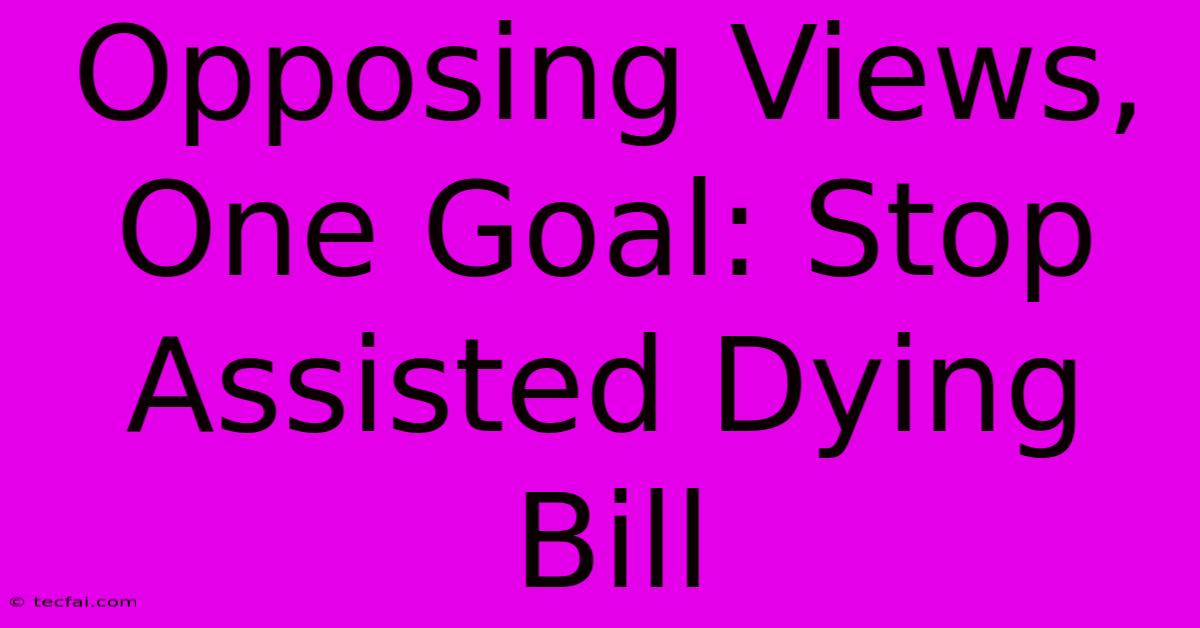Opposing Views, One Goal: Stop Assisted Dying Bill

Discover more detailed and exciting information on our website. Click the link below to start your adventure: Visit Best Website tecfai.com. Don't miss out!
Table of Contents
Opposing Views, One Goal: Stop Assisted Dying Bill
The debate surrounding assisted dying legislation is a complex and emotionally charged one, pitting deeply held beliefs against the desire for autonomy and control at life's end. While proponents and opponents may vehemently disagree on the morality and ethics involved, a surprising common ground emerges: a shared goal to ensure vulnerable individuals are protected and receive the best possible care. This article explores the diverse viewpoints fueling this intense debate and how both sides ultimately aim to achieve a similar, albeit differently defined, outcome.
Proponents: Compassionate Choice and Patient Autonomy
Advocates for assisted dying legislation often frame their arguments around compassion and patient autonomy. They argue that individuals facing unbearable suffering and terminal illnesses should have the right to choose how and when their lives end. This choice, they believe, is a fundamental aspect of personal liberty and self-determination.
- Key arguments: The right to die with dignity, relief from intractable suffering, control over one's end-of-life experience, and avoiding prolonged and agonizing deaths.
- Focus: Protecting the rights of competent adults to make informed decisions about their own lives, even if those decisions are difficult for others to accept.
- Safeguards: Proponents typically emphasize the need for robust safeguards, such as multiple medical evaluations, psychological assessments, and waiting periods, to prevent coercion and ensure informed consent. These safeguards are crucial to addressing concerns from opposing viewpoints.
Opponents: Protecting the Vulnerable and Sanctity of Life
Opponents of assisted dying legislation frequently cite concerns about the sanctity of life, the potential for abuse, and the vulnerability of certain populations. They argue that legalizing assisted dying could inadvertently lead to the devaluation of human life and disproportionately affect marginalized groups.
- Key arguments: The inherent value of human life, regardless of suffering, the potential for coercion and undue influence on vulnerable individuals (elderly, disabled, mentally ill), the difficulty of definitively determining terminal illness and unbearable suffering, and the slippery slope argument leading to broader implications.
- Focus: Protecting those who might be pressured into choosing assisted dying, ensuring equitable access to palliative care, and upholding the ethical principle of preserving life.
- Alternative Solutions: Opponents often advocate for improved palliative care, enhanced access to pain management, and greater support for individuals facing terminal illnesses. They believe these measures address the suffering without compromising the sanctity of life.
Finding Common Ground: Protecting the Vulnerable
Despite their fundamental disagreements, both sides share a common goal: protecting vulnerable individuals. Proponents advocate for safeguards to prevent coercion, while opponents emphasize the need for robust protections against potential abuse and exploitation. This shared concern highlights the possibility for constructive dialogue and the development of legislation that balances individual autonomy with societal protections.
The debate requires careful consideration of ethical implications, legal frameworks, and practical implementation. Focusing on shared concerns – the need for compassionate care and the protection of vulnerable individuals – may pave the way for a more nuanced and productive conversation. Ultimately, finding a solution that satisfies both sides might involve a delicate balance of empowering individuals to make end-of-life decisions while simultaneously safeguarding against potential harms.
Moving Forward: A Call for Collaboration
The assisted dying debate is far from resolved. However, recognizing the shared goal of protecting vulnerable individuals offers a starting point for constructive dialogue and compromise. Open and honest communication, careful consideration of safeguards, and a focus on compassionate care are crucial steps towards navigating this complex issue and finding solutions that respect both individual autonomy and the sanctity of life. Further research into the experiences of other jurisdictions that have legalized assisted dying is also essential to inform future policy decisions.

Thank you for visiting our website wich cover about Opposing Views, One Goal: Stop Assisted Dying Bill. We hope the information provided has been useful to you. Feel free to contact us if you have any questions or need further assistance. See you next time and dont miss to bookmark.
Featured Posts
-
Bishop Jakes Recent Illness
Nov 26, 2024
-
Romes Hidden Gems Holy Year Tourism Relief
Nov 26, 2024
-
Save Roy Keane For Tv Viewers
Nov 26, 2024
-
Jon Benet Ramsey Netflixs Crucial Clue
Nov 26, 2024
-
Hungarian Hotel Chess Master Challenge
Nov 26, 2024
